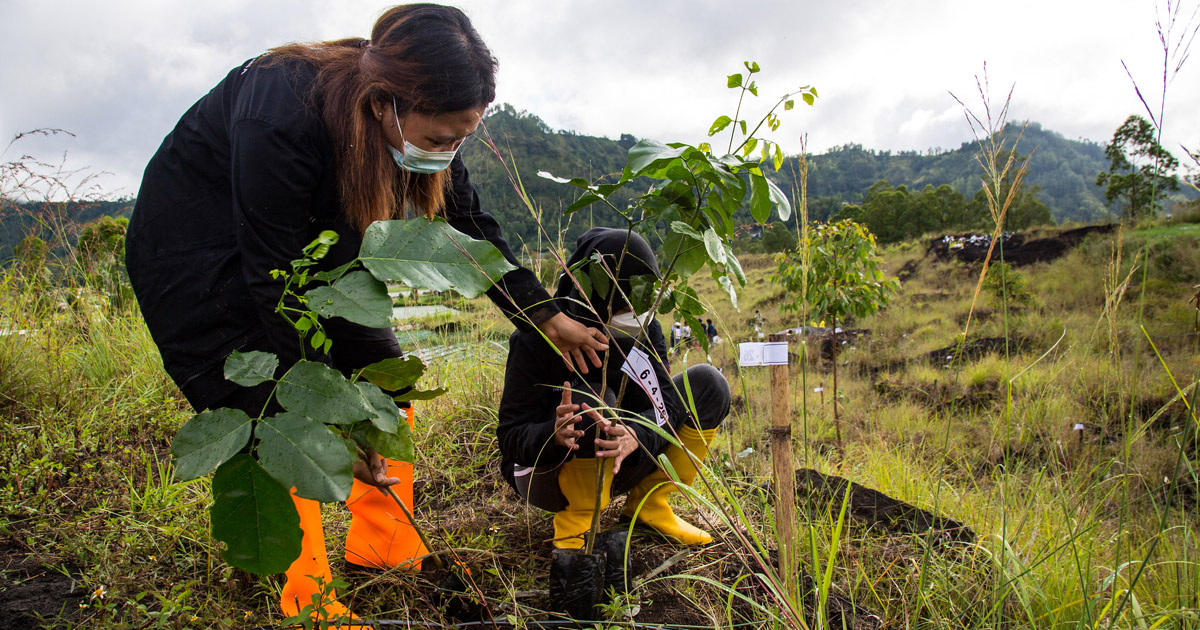
The two organizations — international and national — are collaborating in research for development of degraded land in Indonesia.
The Faculty of Forestry of Institut Pertanian Stiper (INSTIPER) in Yogyakarta, Indonesia is a private university established in 1958, with two campuses located in Maguwoharjo and Papringan. The term ‘Stiper’ derives from its earliest incarnation as Sekolah Tinggi Perkebunan (Plantations High School). INSTIPER signed a Memorandum of Understanding with CIFOR-ICRAF on 14 April 2023 to jointly collaborate on research, capacity building and funding mobilization.
“We are very pleased to have a formal agreement to collaborate with CIFOR-ICRAF,” said Rawana (sole names are common in Indonesia), dean of the Faculty of Forestry. “We expect that together we will be able to address important questions regarding restoration of degraded land, particularly, ex-mining and mangrove areas, which are under-researched.”
Of considerable interest to both organizations is the potential for such degraded land to become productive again and contribute to meeting national climate and economic goals, such as through bioenergy agroforestry with oil-seed species Millettia pinnata (the genus was formerly known as Pongamia and is often called ‘malapari’ in Indonesia) and Calophyllum inophyllum (known as ‘tamanu’ in many parts of Indonesia), along with other multipurpose tree species, annual crops and livestock, including fisheries.
“The potential for these two oil-seed species is still under-developed, not just in Indonesia but globally,” said Himlal Baral, senior forest and landscape restoration scientist with CIFOR-ICRAF’s climate change, energy and low carbon development team. “We aim to test them in mixed species’ agroforestry systems that can provide not only bioenergy supply from the seeds but also multiple benefits for smallholders, such as food and nutrition security, fodder, financial risk reduction, nutrient cycling and natural fertilization, shade and water regulation, along with carbon sequestration, which will support Indonesia’s Nationally Determined Contribution to the UN Framework Convention on Climate Change. Without restoration, degraded land would contribute almost nothing to anyone.”
These ambitions are in line with INSTIPER’s mandate to play an active role in developing science and technology, fostering a progressive programme of academic invention and research, and contributing to nation building through the provision of qualified practitioners who strive to enhance the welfare of communities, improve the quality of land conservation and restoration, and develop environmental and cultural sustainability.
“CIFOR-ICRAF has a long history of commitment to working closely with national research bodies such as INSTIPER,” said Robert Nasi, who is currently fulfilling many roles at the organization: Chief Operating Officer, CIFOR-ICRAF; Director General, CIFOR; Director, Global Landscapes Forum; and Managing Director, Resilient Landscapes. “In this MoU, we expect to conduct collaborative research into landscape restoration, bioenergy and other mutually agreed topics relevant to peatland and mangrove restoration, area reclamation, and renewable energy in Indonesia. And we will be actively seeking external partners interested in investing in this globally important research.”
These efforts will also contribute to the Faculty of Forestry’s goal of becoming one of the world’s leading universities through mutually beneficial and strengthened cooperation with various organizations –government, non-government and private – both from within and outside the country.












